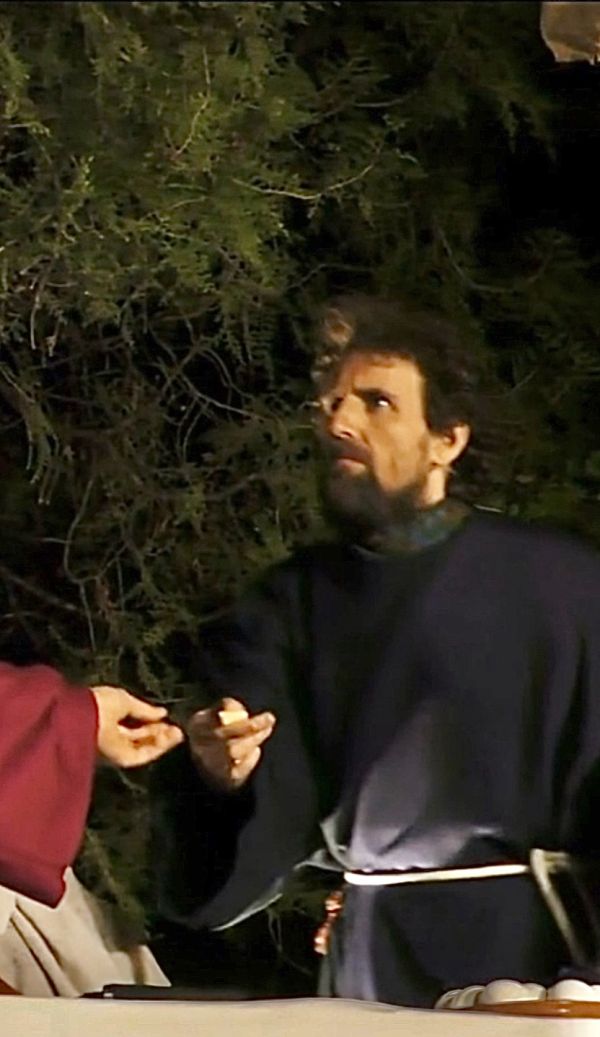Turning page «Glory»
(Jn 13:31-35)
Judas is among the convitee, but he does not assimilate the Bread. He takes it, yes. But he does not makes it own at all.
He takes it and leaves, to run after his illusions of having and power. To pursue the occult pact, with the old spiritual guides.
Thus he «sinks into the night». Reminder for each of us.
Despite this, divine Glory manifests itself - even in the limit. It is Love without preconditions. Difference between relationship of Faith and code of devotions.
Paradoxical realisation. Source and Summit of the Core of Being. Unveiling and Manifestation of what God Himself is.
We are in the «Hour»: announced by the whole unfolding of the Fourth Gospel. Love that does not depend.
Invincible Love, which does not fail even as a result of our uncertainties and inflections, or our denials.
We who are supposed to be His Intimates. Friends and Brethren of the «Son of Man».
«Son of Man» already designates from the First Testament the character of a holiness that surpasses the ancient fiction of the rulers, who piled on top of each other reciting the same script.
The masses remained dry-mouthed: whichever ruler seized power, the petty crowd remained subdued and suffocated.
The same rule was in force in religions, whose leaders lavished the people with a strong horde impulse and the contentment of the gregarious.
In contrast, in the Kingdom of Jesus there must be a lack of ranks - which is why His proposal does not fit in with the ambitions of the authorities, and with the Apostles' own expectations.
They too wanted to “count”.
But precisely «Son of Man» is the person according to a criterion of humanisation, not a beast that prevails because it is stronger than the others [cf. Dan 7].
Every man with a heart of flesh - not of wild, nor of stone - is an understanding person, capable of listening, always attentive to the needs of the other, who makes himself available.
All this alludes to the broad dimension of holiness; transmissible to anyone, and as creative as love, therefore all to be discovered!
In the Gospels, the «Son of Man» is the true and full development of the divine plan on humanity.
Such a plan is not hindered by the frequenters of bad places.
It is not a proposal compromised with doctrine-and-discipline religion, which drives back eccentricities.
That of the «Son of Man» is the kind of holiness that makes us Unique, not one that always abhors or exorcises the danger of the unusual.
In short, Jesus entrusts his Testament to the disciples. Mutual union is the Lord's Last Will. With a radical novelty.
Love for one's neighbour was already among the ancient prescriptions, and Christ seems to trace its very formulation (Lev 19:18).
Yet the Son does not only allude to compatriots and proselytes of his own religion.
He breaks down barriers hitherto considered obvious.
In fact, mutual love is on the same line as the encounter with oneself - where by grace and vocation lurks a possession of riches, of growing perfections, that want to surface.
From such a treasure chest-knowledge, a solid platform, arises the afflatus of being able to give life: but to increase it, make it full and cheer it up.
Starting not from external conditioning.
In fact, the commandment is «new» not only because it is edifying and stimulating; even unsurpassable, and capable of supplanting all norms.
Above all, because it reveals one's own Vocation.
It expresses a manifestative bond, which becomes foundation, growing motive and driving force; lucid energy, which gives us the ability to shift our gaze and turn the page.
It introduces a new age, a new realm. Not one-sided.
It is the figure of the victory of Easter, theophany and testimony of its authentic People: «not with measure» (Jn 3:31-36: 34).
The «without measure» is that of the mystical wedding between the two "natures", of the intimate friendship that penetrates the life of the Father.
«Glory» [irreducible] with special characteristics.
Now the morality of ancient philosophies no longer applies: ours is a vocational and paschal ethic, in the Spirit who renews the face of the earth.
Every purpose is illuminated by the victory of life over death. In this way, behaviour is configured to the Mystery.
We live in Christ, the new man: we are no longer under “proper” duties and prescriptions.
The baptismal attitude cannot be 'measured'.
The anointing and the call received respond to the intimate passion, the sense of reciprocity and personal fullness, which are dilating.
In this way they move eminent goals: in participation to the fullness of life, excess that cannot be assimilated to conformism and average horizons.
For a pious Israelite to have «glory» is to give specific 'weight' to one's existence, and to reveal its full value - but sometimes in an elective sense.
Blooming is our complete 'pondus' and character and worth, which, however, germinate from the whole universe within, and from the different faces that belong to us; even from the 'shadow sides'.
Here is the blossoming of Messianic Peace-Presence; a sense of Friendship with the whole being and roots, with history and the sign of the times.
For the more human we are without duplicity, and the more capable we are of reading events, and the more sensitive we are in grasping the variegated powers - that Someone within something... the more the Heaven within us manifests itself.
This is the emblem of the New commandment, which marks difference. Integrating; making opposites coexist in us.
New Covenant; new harmony.
Making us Complete from within, like Jesus. Glory of the Father, and of humanity.
[5th Easter Sunday (year C), May 18, 2025]












